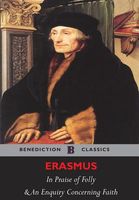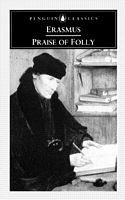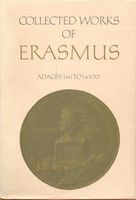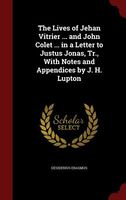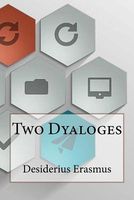- Welcome to FictionDB, Guest
- | My Account
- | Help

Desiderius Erasmus
Books in Order: 10 titles
The book list is sorted in publication date order - newest first. You can sort the list by clicking on the Sort button. To see a simple list or a cover view list, click on the icons below.
-
The Praise of Folly and an Enquiry Concerning Faith
- Oct-2015
- / General Fiction
In "Civilization," Kenneth Clarke states "The first man to take full advantage of the printing press was Erasmus. It made him, and unmade him, because in a way he became the first journalist. He had all the qualifications: a clear, elegant style (in ...
-
-
In Praise of Folly
- Feb-2013
- / General Fiction
This witty, influential work by one of the greatest scholars of the Renaissance satirizes the shortcomings of the upper classes and religious institutions of the time. The most effective of all Erasmus's writings -- ripe with allusions, vignettes, ...
-
-
Praise of Folly
- Mar-1994
- / General Fiction
Erasmus of Rotterdam (c. 1466-1536) is one of the greatest figures of the Renaissance humanist movement, which abandoned medieval pieties in favour of a rich new vision of the individual's potential. Praise of Folly, written to amuse his friend Sir T...
-
Adages: Ivi1 to Ix100, Volume 32
- Mar-1989
- / General Fiction
‘A knowledge of proverbs contributes to a number of things,’ wrote Erasmus in his Introduction to the Adages, ‘but to four especially: philosophy, persuasiveness, grace and charm in speaking, and the understanding of the best author...
-
-
The Colloquies Of Erasmus
The Dutch humanist Desiderius Erasmus was a hugely influential author of the Renaissance. His prolific and diverse writings made him a contentious figure, often inciting controversy for his criticism of religious institutions. Called the "Prince ...
-
The Lives of Jehan Vitrier ... and John Colet ... in a Letter to Justus Jonas, Tr., with Notes and Appendices by J. H. Lupton
This is a reproduction of a book published before 1923. This book may have occasional imperfections such as missing or blurred pages, poor pictures, errant marks, etc. that were either part of the original artifact, or were introduced by the scanning...
-
-
Two Dyaloges
Gerrit Gerritzoons (1466 or 1469 - 1536) was a Dutch humanist and theologian. He wrote under the pseudonym Desiderius Erasmus and was sometimes known as Desiderius Erasmus of Rotterdam. He was a classical scholar who wrote in a "pure" Latin style. Al...
